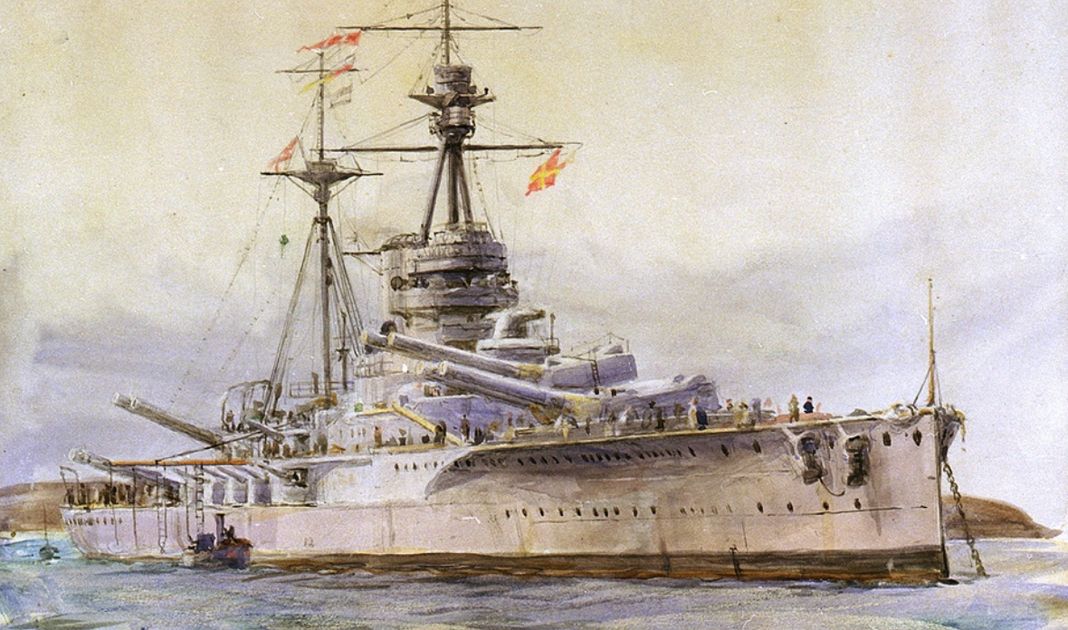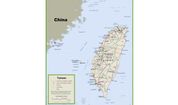Russell Grenfell’s Sea Power (1940)

(wikipedia.org)
Grenfell was born in 1892 and, like his father before him, joined the Royal Navy. He was promoted to the rank of lieutenant a month before the outbreak of the First World War, serving aboard HMS Triumph first as part of the Siege of Qingdao (1914), the first Anglo-Japanese operation of WWI, and then during naval operations in the Dardanelles Straits, where it was sunk by a U-21 in May 1915. After Grenfell served in HMS Revenge before going on to become a senior commander at the Royal Naval Staff College in Greenwich, retiring in 1937.
His book “Sea Power” was published in September 1940 under a pseudonym, T 124, because it advocated a strategic approach that was fundamentally at odds with that of the British government at the time. This can be summarised in the final two sentences of the last chapter:
‘England,’ said Napoleon at St. Helena, when he no longer had any object in not saying what was in his mind, ‘can never be a continental power, and in the attempt she must be ruined. Let her stick to the sovereignty of the seas, and she may send her ambassadors to the courts of Europe and demand what she pleases.’
“The British Empire,” Grenfell argues on page 250, “is a maritime empire, acquired through and dependent for its continuance on sea power. Let that sea power but decline and the whole imperial edifice will collapse. Yet while we were goading ourselves into a state of extreme agitation about the fate of Germany’s European neighbours and asking ourselves reproachfully whether we had sent enough soldiers to help the French, or the Norwegians, or someone else, we were entirely failing to appreciate the very serious aspect of our naval losses that were gradually mounting up. So much stress has been laid on our great naval superiority over Germany that the public has omitted to notice that Germany is not the only naval power in the world. By the regrettable alacrity with which we hurried into the naval disarmament agreements after the last war, we reduced ourselves to a condition of parity with the United States of America and only a meagre superiority over the Japanese. These agreements took no account of one-sided war losses. Such losses are nevertheless taking place; and of the three principal signatories of the Washington naval treaty, it is to ourselves only that the losses are occurring. The result may well be that the end of the war finds Britain no longer the foremost naval power that she has been for centuries, but the second naval power, or even the third. Such a possibility is far more alarming than anything that might happen in Europe.”
It was dangerous, Grenfell argued, for Britain to attempt to re-imagine itself as a continental land power, firstly because it was struggling to maintain its traditional status as a sea power against the likes of the US and Japan, and secondly because the traditional continental land powers – i.e. Germany – would become suspicious.
“Nations, like individuals, have their part to play in the world, for which nature has specially fitted them. For the British, this part is undeniably a maritime one. During the 19th century, we were universally recognised as the paramount naval power, with whom no one else till the very end of the century took the trouble seriously to compete. On the whole, we filled that position with dignity and success. The world, if it felt a certain envy of our undisputed maritime supremacy, was well enough content that we should hold it, for we used it wisely and with moderation.
“But there was one condition attaching to that general acceptance of the British primacy in matters nautical. It was that the supreme British Navy should be accompanied by only a small British Army. That condition we have now infringed by our entering of the continental lists in the last war and in this one as a first class military power. In so doing, we have courted the distrust and suspicion of the military nations, while at the same time we have done our best to encourage the ambitions of our naval rivals by our reckless reductions of our fleet. A more ominous combination for a nation whose strength and special genius are on and whose principal sources of wealth lie across the sea could hardly be devised.”
These quotes all come from the book’s last chapter, “Our Future Strategy.” Other chapters cover the rise of German sea power, the Anglo-French Entente and its strategic consequences, the Channel ports, the influence of the French on British strategy from 1914 to 1918, sea power in defence and offence, sea power and national aptitudes, the influence of the air on sea power and the economic factor. The full text of the book is available online at archive.org.
“Sea Power” provides an alternative – and now largely forgotten – perspective of WWII from Winston Churchill’s romantic-idealist “We Shall Fight on the Beaches” speech, broadcast just four months earlier in June 1940, referencing a planned German invasion of the south coast of England that never materialised (“Operation Sea Lion”). For Grenfell, Germany was clearly not the biggest strategic threat Britain faced. He was correct here insofar as the Germans were actually planning to invade Russia instead (“Operation Barbarossa”).
When Grenfell writes in 1940 about “our naval rivals,” he actually means the United States and Japan. And again, he was correct. To quote Strategy&Future’s Jacek Bartosiak, “The fall of Singapore destroyed the British Empire forever.”
After his daring five-hour flight from Augsburg, Bavaria, to Dungavel, Scotland, in May 1941 (flying low to avoid detection), Rudolf Hess – Hitler’s deputy and Haushofer’s protege – had planned to meet and secretly negotiate a peace agreement with the Duke of Hamilton. He was arrested shortly after revealing his true identity (Hamilton did not want to have anything to do with it) and requested a copy of Grenfell’s “Sea Power” amongst other books. It has therefore gone down in history as a piece of this very mysterious puzzle although very few people (apart from Hess) seem to have actually read it.
It’s very clear from “Sea Power” that Grenfell viewed Nazi Germany as an adversary. Where he differed from the British military establishment was in terms of strategy:
“The continental strategy with which we entered the war lies in ruins. Our armies have gone to the Continent and have suffered a disastrous series of reverses, being compelled to make one forced evacuation after another, culminating in the astonishing evacuation from Dunkirk, by which a British Army of more than a third of a million was snatched by superior sea power from what the whole world had thought to be certain destruction or capture.”
“The strategy of sending a British Army to take part in the continental fighting has failed completely. It has not prevented the enemy from gaining the Channel ports and flooding into territory adjacent to the coasts of England from which he may launch an attack upon us. What it has done to deprive us of adequate means of meeting the attack. We should undoubtedly be safer at this moment if the time, effort, and money expended on equipping an army of 400,000 men to send to France had been devoted instead to ships and aircraft. …”
“… We should seek the least bloody way of achieving our object. And I say ‘achieving our object’ deliberately, in preference to the words ‘victory’ or ‘winning the war’. Those two latter terms are perhaps the most dangerous ones in the English language at the present time, inasmuch as they deceive many people into thinking that we cannot win until we have ‘smashed the Germans’ and that to smash the Germans we must have soldiers marching into Germany.”
Ultimately, Grenfell was right again. Britain would achieve its object – in tandem with the Americans – by putting “boots on the ground” in western Europe. But “victory” came at a steep cost. They were on the winning side but were fast losing “primacy in matters nautical”.
Autor
Thomas Riley
Thomas Riley runs the Flows and Frictions podcast for Strategy&Future. Originally from Manchester, England, he has been living and teaching English in Katowice since 2009.






Trwa ładowanie...